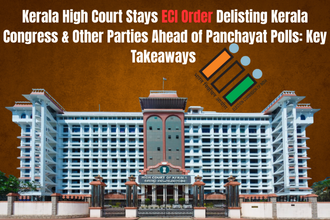In a decisive move aimed at combating the severe air pollution crisis in Delhi-NCR, the Supreme Court of India on May 6, 2025, directed the states of Uttar Pradesh, Rajasthan, and Haryana to invoke their powers under Section 5 of the Environment Protection Act, 1986 (EPA) to enforce a complete ban on firecrackers in the National Capital Region. The direction came in the long-standing MC Mehta v. Union of India case, which deals with environmental degradation, including stubble burning and pollution due to firecrackers.
Key Highlights:
- The Court emphasized the mandatory enforcement of its April 3, 2025 order banning the manufacture, sale, and bursting of firecrackers in NCR.
- It clarified that failure to comply with the directions could lead to Contempt of Court proceedings.
- The bench comprising Justice Abhay S. Oka and Justice Ujjal Bhuyan underscored the use of Section 5 and Section 15 of the EPA to ensure compliance and impose penalties.
- The directive mandates the creation of a compliance mechanism in all NCR states within one month.
Firecracker Ban: Context and Background
The issue of air pollution in Delhi NCR has been a recurring problem, especially during the winter season when emissions from firecrackers and stubble burning create a toxic smog across the region. Despite numerous judicial orders and government advisories, enforcement remains patchy.
In light of this, the Supreme Court has stepped in again, reinforcing its earlier position and directing the NCR states to issue formal orders under Section 5 of the Environment Protection Act, 1986, which empowers state authorities to take necessary measures to protect the environment.
What is Section 5 of the Environment Protection Act?
Section 5 of the EPA, 1986 authorizes the Central Government (and delegated state authorities) to issue binding written directions to any person, officer, or authority to ensure compliance with the provisions of the Act. These directions can include the closure, prohibition, or regulation of any industry or operation that harms the environment.
In 1988, the central government delegated this power to the states of Uttar Pradesh, Rajasthan, and Haryana, enabling them to act independently under Section 5 in matters concerning environmental protection in NCR.
The Supreme Court noted that Delhi had already issued such a direction under Section 5 as early as December 19, 2024, imposing a year-round ban on firecrackers, including their manufacture, sale, online delivery, and bursting.
Why the Emphasis on Enforcement?
The Court made it clear that mere issuance of directions is not sufficient. There must be strict and scrupulous enforcement of the firecracker ban by all relevant authorities. In fact, the bench warned that non-compliance by officials would invite proceedings under the Contempt of Courts Act, 1971.
“Directions under Section 5 of the Environment Protection Act must be taken to their logical conclusion by ensuring that penalties under Section 15 are imposed,” the Court said.
What is Section 15 of the EPA?
Section 15 of the Environment Protection Act provides for penalties in case of contravention of the Act or any direction issued under it. Following the Jan Vishwas (Amendment of Provisions) Act, 2023, Section 15 has been amended to introduce monetary penalties for violations.
The Court underscored that enforcement must include penal action under Section 15, thereby ensuring that violators face consequences—be it citizens, businesses, or government officials failing in their duties.
Compliance and Enforcement Mechanism
The Court reiterated that the states must establish a concrete compliance mechanism within one month. For example, in Rajasthan, the task of enforcement has already been assigned to the Additional Director General of Police, Crime Branch.
Each NCR state has now been directed to:
- File compliance affidavits before the next hearing.
- Ensure wide publicity of the firecracker ban and associated penalties.
- Implement directions under Section 5 and follow up with penalties under Section 15.
- Activate law enforcement machinery to monitor and ensure compliance.
Firecracker Ban in West Bengal Not Considered
The Court also dismissed an interlocutory application (IA) challenging the firecracker ban in West Bengal, clarifying that the present public interest litigation (PIL) only addresses environmental concerns specific to Delhi NCR. However, it kept all broader legal questions open for future adjudication.
Broader Implications: Air Pollution, Climate, and Public Health
The Supreme Court’s directive comes at a time when air quality indices (AQI) in Delhi NCR frequently breach the “severe” category, affecting public health and burdening the healthcare system. Firecrackers, particularly during festivals like Diwali, contribute significantly to PM2.5 and PM10 pollution levels.
This ruling reinforces the judiciary’s proactive stance on environmental protection and aligns with international best practices on curbing urban pollution. It also sends a strong message to both state authorities and citizens that non-compliance will have legal consequences.
Conclusion
The Supreme Court’s directive underlines the urgency of addressing the environmental crisis in Delhi NCR. By invoking Section 5 and 15 of the Environment Protection Act, the Court has given NCR states a robust legal mandate to not only ban firecrackers but also enforce it effectively with penalties.
As the MC Mehta case continues to shape India’s environmental jurisprudence, this development signals a no-tolerance approach to pollution and paves the way for stricter, more accountable governance mechanisms in the field of environmental protection.


